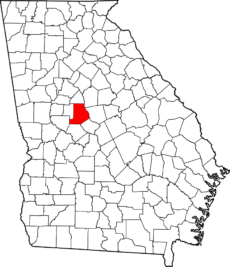By Max Blau
People living near Plant Scherer, America’s largest coal-fired plant, are one step closer to not having to rely on tainted water from private drinking wells.
But the decision hasn’t quelled local residents’ demands that Georgia Power remove coal ash from the plant site in Central Georgia.

Monroe County commissioners on Thursday approved an allocation of $213,560 for an engineering firm to develop bid specifications for a potential $16.3 million project to install nearly 73 miles of water lines. Once approved, the full project would be expected to take two years to complete, and would provide water service to 852 new customers in Juliette, people who currently get their drinking water from wells.
The decision comes after the Altamaha Riverkeeper, an environmental organization, found troubling levels of toxic heavy metals in dozens of private wells in the area. The well testing results, first reported by Georgia Health News and Grist, led to a wave of headlines, packed town hall meetings, and lobbying for coal ash legislation at the state Capitol.
Since then, county commissioners have secured water tankers to provide a temporary supply of clean drinking water to Juliette residents.
The water line project would be followed by a second $5 million project to build two water treatment units, pending approval of a state permit to withdraw water from the nearby Ocmulgee River or High Falls Lake.
“I’m excited to see anything is happening,” said Pam Wolff, a Juliette resident who has organized her neighbors in a private Facebook group. “It’s been in a lull. This is a very important issue to us, and I wondered if it’s actually going to happen.”
But Fletcher Sams, executive director of the Altamaha Riverkeeper, worries that the water line project is moving too slowly. “Not being bid-ready yet leads me to believe there’s no or little progress being made on this project,” he told Georgia Health News.

Residents, meanwhile, fear the potential water lines will not solve the underlying issue of contaminated groundwater in the area.
The coal ash kept at Plant Scherer is enough to fill 4,700 Olympic-sized swimming pools, and a portion of it is submerged in groundwater, according to a hydrogeologist who reviewed site records for the Southern Environmental Law Center. While water lines may provide clean drinking water in the future, some residents say that won’t minimize health risks over the next few years.

Georgia Power has proposed sealing the coal ash in place permanently, and denies that the plant’s waste is connected to the evidence of heavy metals such as mercury, boron, calcium, sulfate and barium found by the riverkeeper.
Exposure to some of those contaminants can lead to long-term health risks including kidney damage (from mercury), reproductive system disruption (from boron), and heart issues (from barium).
Juliette resident Stephen Hammond, whose well tested positive for hexavalent chromium, a carcinogen, recently told Georgia Health News that the closure plans, if approved by state regulators, would subject the area’s groundwater to future risk of potential “irreversible” damage.
Some members of the Monroe County Commission say they are also exploring a potential lawsuit against Georgia Power, if they can find strong evidence of a connection between the contaminated wells and the coal ash.
As part of this effort, county officials have hired Harbin Engineering to conduct limited water sampling, but will not immediately share the results with Juliette residents. They had previously commissioned a study from Avner Vengosh, one of the nation’s top coal ash experts, but scuttled his contract after he refused to keep his data confidential. The officials have said confidentiality is important to protect the county’s position in potential litigation.
Max Blau is an Atlanta-based journalist who writes narrative and investigative stories, which have recently appeared in Atlanta magazine, The New York Times, and The Washington Post.

